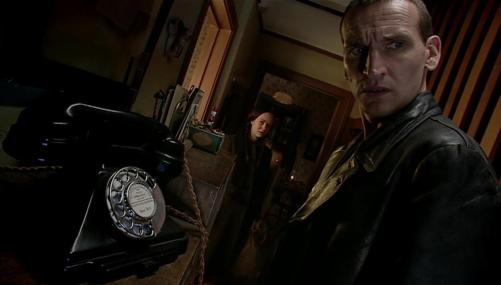
“The Empty Child / The Doctor Dances” is one of the shining gems of Doctor Who’s first season and the writing debut of Steven Moffat, who later became Doctor Who’s second showrunner after Russell T. Davies. As of now, he’s currently the man who’s written the most material for NuWho, so he’s had a tremendous amount of influence on the show since it returned to television. “The Empty Child” proves to be a good first impression, finding just the right balance of creepiness and goofiness to be incredibly charming. It’s fun to watch the past and future collide in this story: alien technology from the 51st century blending with a rustic World War II setting to create a bizarre, zombie plague. I find Moffat’s stories from the RTD era provide an early insight into his vision of “Doctor Who” and lay down all the tropes and themes of his own era. For one example, Moffat’s favorite type of horror is conceptual horror. An idea in your head can be every bit as scary as a lumbering monster onscreen, and he loves crafting villains that unnerve you with all their subtle implications.
Secondly, children are the ultimate symbol of innocence and morality in the Moffat era, and he loves writing stories about families. Cal was a dying little girl given eternal life by her family to live out her dreams. Amy missing out on having a normal childhood is portrayed as a tragedy, and River even more so. The star whale chose to help out humanity because he couldn’t stand to see their children suffer. Kazran Sardick was hardened into a miserable miser because of an abusive childhood. Captain Avery knew he hit rock bottom when he almost got his son killed. Madge Arwell tried to bury her own grief over her recently departed husband to give her kids a good Christmas. An early sign of how amoral and villainous the Great Intelligence is is the fact that he often preys on children, robbing them of a proper childhood to serve as his minions. Clara is immediately shown to be a good person because she’s kind to children. Danny Pink’s most horrific wartime experience, and the stain on his soul, is the day he unwittingly shot a child civilian. When the Doctor recounts how the time war ended, with Gallifrey burning, it’s mostly the kids he’s sad about. So it’s very fitting that Moffat’s debut story is about a tormented child.
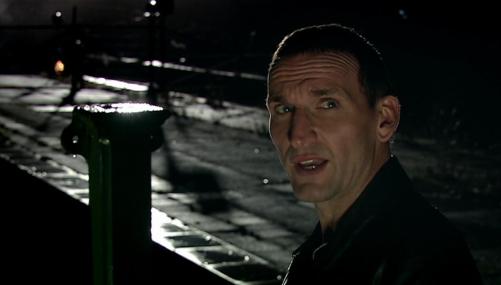
The Ninth Doctor is in good spirits this week, and his dialogue is on top form. One of the best things about Steven Moffat’s writing style is that he has a very good grasp on the Doctor’s character and what makes him tick (which is apparent as early as “The Eleventh Hour“). Even in his weakest stories, the Eleventh and Twelfth Doctors were usually pretty engaging to watch. Russell T. Davies tends to view the Doctor as a lonely, romantic messiah figure, while Steven Moffat thinks of him as an ingenious madman in a box. Those two interpretations are not incompatible, but there are some noticeable differences between them: the Ninth and Tenth Doctors always seemed a bit more quippy and cheery than usual whenever Moffat wrote them.
Nine is separated from Rose very early on, and he spends most of “The Empty Child” investigating on his own, which is fun. As much as I enjoy the chemistry between the Doctor and his companions, I also like seeing him fly solo once in a while. His demeanor changes a lot when he’s not trying to impress his friends, and in some ways, he becomes more straightforward and earnest. Nine continues to be a clever and perceptive detective, chasing down every lead that presents itself and occasionally goading people with reverse psychology to give him the answers he wants. He also lets his age show more than usual in this story: he ruminates on how humans can both frustrate him and impress him endlessly with their indomitable spirit; he briefly connects with Nancy and Dr. Constantine because they’ve all lost people they love; and his compassionate side is on display whenever he deals with Jamie as a former father. The Doctor is presented as a paternal figure several times in this two-parter, being the oldest character present. Even when he’s chewing out Captain Jack for causing the zombie plague to happen, he almost resembles a parent scolding an ignorant child.
The Doctor is quite brusque and standoffish towards Captain Jack throughout this two-parter, partly because he suspects Jack has something to do with the current gas mask zombie outbreak, and partly because he’s clearly annoyed that Rose likes him. Between Mickey, Adam and Jack, the Doctor feeling jealous and competitive around other guys that Rose likes has been a pretty clear thread throughout this season, and we’ll get the gender-flipped version of it next season (Rose vs Sarah Jane is not gonna be pretty). Still, the Doctor is gradually won over by Jack, despite himself, and he eventually saves his life by bringing him onboard the TARDIS as a companion, showing that his character development from the events of “Father’s Day” has stuck.
“The Empty Child” establishes the Doctor’s stance on romance and sexuality in NuWho; namely that he’s pansexual and friskier than his friends give him credit for. In the classic series, the Doctor rarely seemed interested in matters of the heart. The fact that Susan existed implied that the First Doctor, at some point, must have met a very nice time lady and had kids with her, but for the most part he seemed uninterested in romance. NuWho takes the exact opposite stance with the character, which is easily the most controversial aspect of the show. For the record, I am not opposed to the idea of Doctor Who shipping, but I do dislike how much Russell T. Davies and Steven Moffat overused it. In the first ten series, the only female companions who didn’t fancy the Doctor at some point were Donna and Bill. Russell especially didn’t do Martha any favors by giving her an unrequited love arc in Series 3. Christopher Eccleston gets a number of good moments in this story, but he shines the brightest during the emotional climax of “The Doctor Dances”. After the deaths of so many good people throughout this season, the Doctor’s unbridled glee about the problem being solved without any loss of life at all is a thing of beauty.
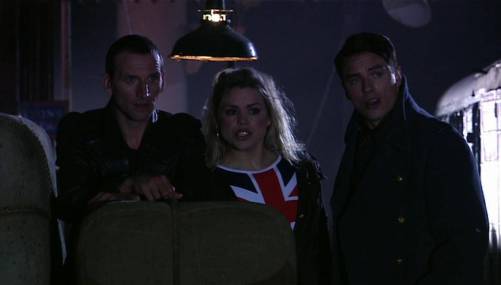
Billie Piper’s Rose is feisty and a lot of fun in this two-parter. By now, the romantic subtext between Rose and the Ninth Doctor is pretty much becoming text, and their chemistry sizzles. Rose has a pretty good idea of what makes the Doctor tick and she respects him, but at the same time, she can’t help playfully teasing him about how unimpressive his approach to time travel can be sometimes. For a 900 year old alien, the Doctor can seem pretty mundane. Rose gets separated from the Doctor early on and has another close shave with death when she gets caught up in an air raid. The flashy and futuristic Captain Jack rescues her, and the pair become attracted to each other pretty quickly.
During their scenes together, where Rose has to handle herself and make important decisions without the Doctor around to back her up, it becomes clear that she’s gained some experience in being a time-traveling adventurer. As always, she’s willing to take some initiative, pumping Jack for info (as Rose’s tenure stretches on, you’ll notice that she loves a good bluff, whether it actually pays off or not). When the Doctor, Rose and Jack team-up to bounce ideas off each other and try to solve the mystery of the empty child, the two men constantly compete to try to impress Rose, and a bizarre but devilishly fun love triangle starts to form between the trio. It’s a rare set-up in the series, but I always enjoy having three people in the TARDIS: it allows for a good melting pot of opinions, and some great banter to form (the Eleventh Doctor, Amy and Rory would be a similarly fun trio in later seasons). To cap off her great characterization in this story, Rose gets a quiet but heartening scene where she talks to Nancy and convinces her not to give up hope during the oppressive war, because it will all be worth it in the future, Rose’s future.
John Barrowman makes his debut in this story as the glorious cheesy yet charismatic Captain Jack Harkness, a major recurring character in the RTD era. Captain Jack is a cheeky, flirtatious, competent, intelligent and roguish time traveler from the future. Jack is a former time agent (secret servicemen who kept the timeline flowing smoothly the way the time lords used to) who now works as a professional conman. Jack likes to perform clever and seemingly harmless cons throughout history, so he can get money and information from the time agency, and in “The Empty Child”, his overconfidence leads him to bite off a bit more than he can chew. Like the Doc, Captain Jack is pansexual, making him the first Doctor Who companion who was anything other than straight, which apparently caused quite a stir in 2005 (I wouldn’t know, because my ten year old self hadn’t even heard of the franchise yet at the time).
Captain Jack famously flirts with anything that walks and he carries a torch for both Rose and the Doctor. Captain Jack’s backstory involves him being betrayed by the time agency, who stole several years’ worth of memories from him, which disillusioned him greatly from his old employers. It’s an intriguing tidbit that hints at a future Captain Jack arc that never actually happened. After “The Parting Of Ways”, the rest of Captain Jack’s character arc involved him being immortal and his new affiliation with Torchwood, so “Doctor Who” never did solve the mystery of his stolen memories. In any case, the Doctor is slow to trust Jack, not only because he sees him as a rival to Rose’ affections, but also because he’s a very shady and perhaps unreliable character. Still, Jack’s heart of gold shines through in the end. He can be cocky, shrewd and boastful, but he can also be caring, resourceful, and ultimately selfless.
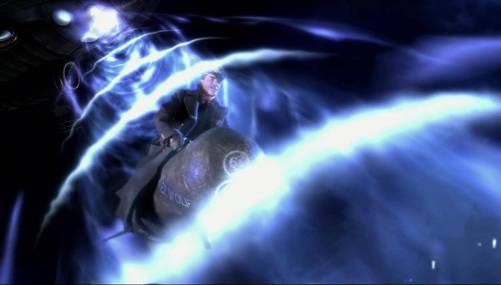
Jack is a different sort of companion than usual for “Doctor Who”. He’s a mercenary from the future, which means (in addition to his fluid sexuality) he’s had a lot of adventures on his own, he knows a lot about temporal mechanics and alien technology, and he’s one of the few characters in this series who can intellectually match wits with the Doctor. In later episodes, the two will not only trade barbs about ethical issues, but also team up to man the TARDIS. Future companions weren’t uncommon in classic Who (like Steven, Zoe and Adric, to name a few), but they’re very rare in NuWho, presumably because the audience would find it more difficult to relate to their skewered, alien perspective than your average contemporary Londoner, and they’re usually reserved as part-time heroes. Another recurring character in the series like Jack is Professor River Song, who is every bit as fun.
When the Doctor accuses him of bringing about the end of the world, Jack denies every bit of it and refuses to take responsibility, something which we know by now pisses the Doctor off. When Jack finally gets confirmation that the plague is his fault, he’s pretty horrified. You’ll notice that incidents like this have been happening a lot this season. Doctor Who often states that time can be rewritten easily, and Series 1 seems to especially stress to new viewers how fragile the timeline can be, even to our heroes’ own meddling. The Doctor almost caused armageddon to happen when he let the Gelth through the Cardiff rift. Rose almost caused it when she was tricked into setting a Dalek free. Adam almost caused it when he led the Editor to the TARDIS. Rose almost caused it again when she tried to save her dad from his demise. And Jack almost caused it when he unwittingly set off the zombie plague. Taking responsibility, the normally selfish conman nearly gets himself killed to fix his mistake, which finally earns him the Doctor’s respect and officially kick-starts Captain Jack’s redemption arc, which will come to a head in the season finale.
Nancy is a homeless youth who prowls the streets of London during air raids, looking for a bountiful score. Nancy has basically become the leader and mother hen of a bunch of homeless kids and teenagers, and she steals food every night from the more wealthy citizens of London to keep all the kids fed. She’s a resourceful and quick-witted thief with a sharp tongue and a preference for propriety, but she’s also a very stern and maternal ward. The Doctor takes a liking to her quickly because of how clever she is, and the mystery she presents as an enigmatic figure. It’s obvious pretty early on that Nancy is hiding something: she knows more about the empty child and the zombie plague than she should and she seems to be running and hiding from something in her past. Jamie, the undead boy, is stalking and targeting her specifically.
While “The Empty Child” is full of silly gags and quippy wartime humor, Steven Moffat uses Nancy’s character to take this story into some darker, more serious territory. Her subplot shines a light on some of the more nasty, unpleasant and repressive aspects of British society in the 1940’s (a world with strict social taboos, where keeping up appearances was historically valued). When Nancy gets busted on one of her raids, she successfully turns the tables on her blustering captor by revealing that she knows he’s a closeted gay man who’s been cheating on his wife for who knows how long with the neighborhood butcher. She rather audaciously and impressively blackmails him into giving her back her freedom, along with some additional supplies. Later, we learn Nancy herself was a teenage single mom who was tossed out onto the streets and left to fend for herself and her new baby. So she lied to everyone, including her son, and told people he was her kid brother out of shame, right up until the day he died. That depressing revelation is surprising, and yet not surprising at all, because it makes perfect sense for the time period.
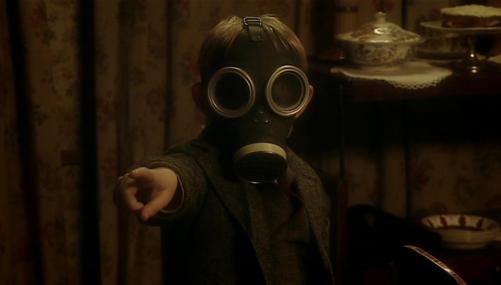
The main antagonist of this story, Jamie, goes through quite a horrific ordeal that only gets worse the more you think about it. Jamie was raised as an orphan for the first four years of his life, with his teen mother pretending to be his sister out of shame. One night, he wanders out during an air raid and gets brutally murdered by a German bomb, with his body basically obliterated. Not long after that, rogue alien technology discovers his corpse, tries to help him and does a terrible job of reanimating him, leaving his body maimed and mutilated with his melted gas mask melded into his flesh. Worst of all, fragments of his consciousness are stuck on a loop, forever circling around the last thoughts he had before he perished – wanting his mother. Jamie is left as an empty shell of a human, crying out for the love he was denied when he was alive, and if there’s even enough of him in there to still feel pain, he must be in horrible agony the whole time.
For a month, zombie Jamie becomes obsessed with finding his mother and relentlessly seeks her out, spreading his unique condition to other people. The empty child virus spreads physical injuries as plague and turns healthy, normal adults into mutilated drones with the mindsets of children, since the nanogenes believe every human being on Earth should be ‘upgraded’ like Jamie. We get to watch the transformation happen ourselves twice, and I like that Moffat draws out both cases just long enough for the audience to realize what’s going to happen before the characters do. Viewers get to look on in a mixture of awe and mortification as flesh and bone and skin twists and contorts and good, ordinary people feel their humanity slip away from them by the second, simply because they were in the wrong place in the wrong time. Is it a wild coincidence that the Doctor happened to visit Dr. Constatine on the night he finally succumbed to the zombie virus? Yes it is. Is it still creepy and effective? Yes it is.
The nanogenes turned Jamie into a super-strong soldier who can punch through walls, call anyone, anywhere on any kind of communication device, and has a telepathic link to all the other zombies, controlling them as an army of the undead to achieve his goal. With so many odds stacked in his favor, the boy seems to be everywhere at once and he’s never far away, stalking our heroes. As time goes on, there’s a growing sense of fear and paranoia surrounding Jamie as things go from bad to worse, as well as a bleak, crushing feeling of doom when it gradually becomes apparent that a perfect storm of a disaster has been created that seemingly can’t be stopped. Just when it seems like all hope is lost, London is saved by Jack taking some responsibility for the first time in years and Nancy accepting Jamie as her son, a miracle that surprises and delights the Doctor as much as the audience.
In retrospect, this outcome is very Moffat. In his grander stories, the end of the everything takes a backseat to the character drama being resolved – and the emotional climax of said stories tend to hinge on a moment of catharsis. “Silence In The Library” is a story about the Doctor solving a mystery in the world’s biggest library, but it’s also a story about River Song’s faith in her husband being tested before it pays off in the end. “The Big Bang” sees the Doctor save the universe from destruction by rebooting it, but it’s mostly about his relationship with Amy Pond and the role he has in her life. “The Time Of The Doctor” has the Doctor fight a war to save a town for centuries, but it’s mostly about the Eleventh Doctor choosing to finally stop running from his past and metaphorically grow up. Despite being set on Gallifrey, the crux of “Hell Bent” is the Doctor and Clara realizing they’re just not good for each other and they need to break-up. Jamie didn’t do anything to deserve the horror he endured in this story (that was mostly brought upon him by other characters), and against all odds, he gets to have a happy ending.
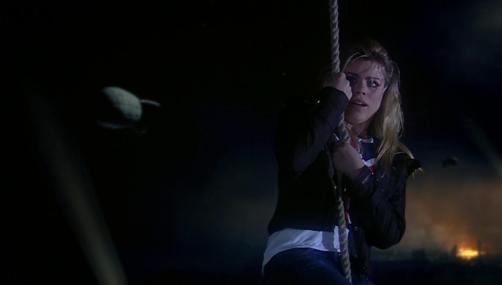
“The Empty Child” is a fairly unique story in Series 1, since it’s set entirely at night. Darkness blankets this entire two-parter, giving it a mysterious mood on a chilly, empty grey night. With that in mind, I have to commend the lighting team and the set designers for all their superb work in this story. There are times when “The Empty Child” bares a lot of resemblance to the old monster movies and sci-fi thrillers from the 40’s and the 50’s, giving it a tone that’s a mixture of old school horror and whimsical, dark fantasy. James Hawes’ direction is the best we’ve seen so far this season, effortlessly alternating between being lively, playful and bombastic, and being taut, tense and uncomfortable, exuding confidence the whole time.
The CGI is noticeably better in this story than it has been in some of the other episodes from Series 1 (including “Father’s Day”), while still being a bit rough and unpolished, which the darkness of the nighttime setting thankfully helps to conceal – like the sequence where poor Rose gets dragged into an air raid. The ever so slightly unnatural look of the CGI actually winds up helping Dr. Constantine’s transformation feel more viscerally wrong when it happens. And I have to say, I really like the sleek, aerodynamic design of Jack’s ship. If the TARDIS is retro, reliable and badass, Jack’s ship is like the sports cars of spaceships, exactly the sort of thing a future boy who loves to show off would ride in. Murray Gold’s dynamic score is once again unreleased for this two-parter, which is quite frankly criminal, since Murray turns in some of his best work this season and writes some great pieces for “The Doctor Dances”, like the exuberant, rising music during the climax. Like most of Murray’s music in Series 1, the score for “The Empty Child” features as an equal amount of synth and an equal amount of jubilant brass, with a few sharp strings thrown in for good measure.
“The Empty Child / The Doctor Dances” is a really strong and enjoyable two-parter, and in retrospect, it also serves as a good blueprint for Steven Moffat’s writing style over the next ten seasons. It nearly claims the title of Series 1’s best story with ease, except “Bad Wolf / The Parting Of The Ways” is still coming up to offer it some friendly competition.
Rating: 10/10.
Side-Notes:
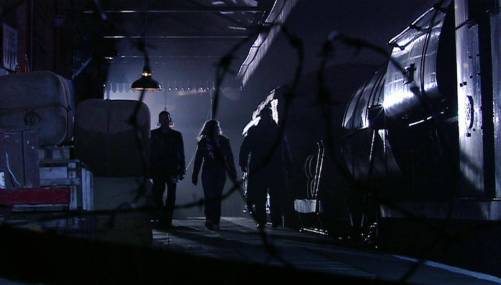
* “What exactly is this thing?” “No idea!” “Then why are we chasing it?” “It’s mauve and dangerous, and about thirty seconds from the center of London!”
* “All the species in the universe and it has to come out of a cow”.
* “Doors, music, people. What do you think?” “I think you should do a scan for alien tech. Just give me some Spock! For once, would it kill you to give me some Spock?!”
* In hindsight, it is blindingly obvious Jamie is Nancy’s son. After all, they both possess the ability to just vanish into thin air.
* Like in “Dalek“, Rose’s hair is frizzier than usual this week, and going by her fashion sense, she’s feeling patriotic.
* “You know, one day, just one day, maybe, I’m going to meet someone who gets the whole ‘don’t wander off’ thing. Nine hundred years of phone box travel, it’s the only thing left to surprise me”.
* “Ernie, how many times? We are guests in this house-” That’s not the word I would use, Nancy.
* “Thank you. That’s much better” “Oh, yeah, that’s a real load off, that is! I’m hanging in the sky in the middle of a German air raid with the Union Jack across my chest, but hey, at least my mobile phone’s off!!!”
* “You mustn’t let him touch you!” “What happens if he touches me?” “He’ll make you like him” “And what’s he like?” “He’s empty”.
* “Are you my mummy?” “No mummies here. Nobody here but us chickens. Well, this chicken”.
* “Easy, I’ll do a scan for alien tech” “Finally, a professional!”
* “Amazing. 1941. Right now, not very far from here, the German war machine is rolling up the map of Europe. Country after country, falling like dominoes. Nothing can stop it. Nothing. Until one, tiny, damp little island says no. No. Not here. A mouse in front of a lion. You’re amazing, the lot of you. Don’t know what you do to Hitler, but you frighten the hell out of me”.
* “We’re just a couple more freelancers” “Oh, I should have known. The way you guys are blending in with the local color. I mean, Flag Girl was bad enough, but U-Boat Captain?!”
* “I’m really glad that worked. Those would have been terrible last words!”
* “Doctor, what’s that noise?!” “The end of the tape, it ran out two minutes ago. I sent the monster to it’s room. This is its room”.
* Here’s another thing about Steven Moffat’s stories – he really likes the ‘we don’t have to go looking for the monster, because it’s already found us’ trope. You’ll also see it pop up in episodes like “Forest Of The Dead”, “The Time Of Angels“, “Day Of The Moon” and “The Day Of The Doctor“.
* “Who has a sonic screwdriver? Who looks at a screwdriver and thinks, ooo, this could be a little more sonic?” “What, you’ve never been bored? Never had a long night? Never had a lot of cabinets to put up?”
* “Battery? That’s so lame!” “Well, I was gonna send in for a new one, but somebody had to blow up the factory!” “Oh, I know. First day I met him, he blew my job up. That’s practically how he communicates”.
* “Now, assets, assets!” “Well, I’ve got a banana, and in a pinch you could put up some shelves”.
* “There are no other exits” “Well, the assets conversation went by in a flash, didn’t it?”
* “You’re the one who keeps us safe” “You think so, Ernie? Then answer this. Jim is sitting there right next to you. So who’s typing?” Oof.
* “Okay, so he’s vanished into thin air. Why is it always the great looking ones who do that?” “I’m making an effort not to be insulted” “I mean, men” “Okay, thanks, that really helped”.
* “What, you mean the child can phone us?” “And I can hear you. Coming to find you. Coming to find you. Coming to find you, mummy!” Jamie dialing his creepy levels up to the max.
* “You’ve got the moves? Show me the moves” “Rose, I’m trying to resonate concrete”.
* “I’ve gotten to know Algy quite well since I’ve been in town. Trust me, you’re not his type. I’ll distract him. Don’t wait up”. The look on Rose’s face as the implications of that quip sink in is priceless.
* “Everybody lives, Rose! Just this once, everybody lives!”
* Russell T. Davies and Steven Moffat both had moments of darkness and light, but one key difference between them is that Russell’s writing style tends to edge more towards cynicism, while Steven’s edges towards optimism. This is especially apparent in Series 4. “Silence In The Library / Forest Of The Dead” and “Midnight” are positioned right next to each other and they have fairly similar set-ups (the Doctor tries to help a group of strangers brave an alien threat), but they have vastly different outcomes.
Further Reading:
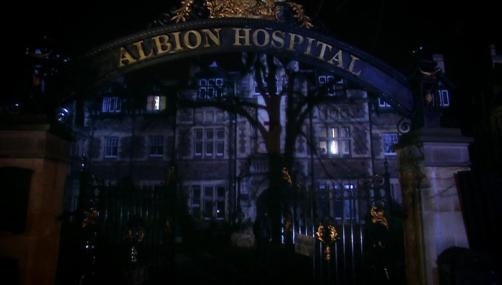

Pingback: Doctor Who: The Unquiet Dead (2005) Review | The Cool Kat's Reviews
Hey! Just wanted to say I love the review! It was so insightful and the criticism was very valid! I hope you keep making more. Love you so much!!
LikeLiked by 1 person
Thanks for the lovely feedback! My review of “Boom Town” ought to be done soon.
LikeLike
Pingback: Doctor Who: Boom Town (2005) Review | The Cool Kat's Reviews
Pingback: Doctor Who: Bad Wolf / The Parting Of The Ways (2005) | The Cool Kat's Reviews
Pingback: Doctor Who: The Christmas Invasion (2005) Review | The Cool Kat's Reviews
Pingback: Doctor Who: The Girl In The Fireplace (2006) | The Cool Kat's Reviews
Pingback: Doctor Who: Aliens Of London / World War Three (2005) Review | The Cool Kat's Reviews
Pingback: Doctor Who: The Long Game (2005) Review | The Cool Kat's Reviews
Pingback: Doctor Who: Father’s Day (2005) Review | The Cool Kat's Reviews
Pingback: Doctor Who: Silence In The Library / Forest Of The Dead (2008) | The Cool Kat's Reviews
Pingback: Doctor Who: The Eleventh Hour (2010) | The Cool Kat's Reviews
Pingback: Doctor Who: The Lodger (2010) | The Cool Kat's Reviews
Pingback: Doctor Who: Robot Of Sherwood (2014) Review | The Cool Kat's Reviews